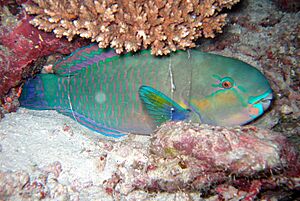Chlorurus sordidus facts for kids
The daisy parrotfish, also called the bullethead parrotfish, is a type of marine fish. Its scientific name is Chlorurus sordidus. It belongs to the parrotfish family, Scaridae.
Quick facts for kids Chlorurus sordidus |
|
|---|---|
 |
|
| Conservation status | |
| Scientific classification |
|
| Kingdom: | Animalia |
| Phylum: | Chordata |
| Class: | Actinopterygii |
| Order: | Labriformes |
| Family: | Scaridae |
| Genus: | Chlorurus |
| Species: |
C. sordidus
|
| Binomial name | |
| Chlorurus sordidus (Forsskål, 1775)
|
|
| Script error: The function "autoWithCaption" does not exist. | |
| Synonyms | |
|
|
Script error: No such module "Check for conflicting parameters".
Contents
What Does the Daisy Parrotfish Look Like?
Daisy parrotfish can look very different! Young fish, or those in their "initial phase," might be dark brown or light gray. They might have a light band around a dark spot near their tail. Bigger fish can have small, light spots in rows towards their tail.
Male fish, in their "terminal phase," can also vary in color. They might have a large tan area on their sides or near their tail. All daisy parrotfish have a rounded snout. This fish can grow up to about 40 centimeters (16 inches) long.
Where Do Daisy Parrotfish Live?
The daisy parrotfish lives in warm, tropical waters. You can find them all over the Indo-Pacific region. This includes the Red Sea and many other areas.
Life in the Ocean for Daisy Parrotfish
Sleeping Habits
Before going to sleep, the daisy parrotfish makes a special cocoon. It creates this cocoon from a slimy mucus that completely surrounds its body. Scientists are not totally sure why they do this. One idea is that it helps protect them from tiny parasites while they sleep.
What Do They Eat?
Daisy parrotfish eat algae that grows on the ocean floor. They use their strong, beak-like mouths to scrape it off rocks and corals.
Social Life and Predators
These fish are quite social. They often swim in large groups with other types of parrotfish. Larger fish, like the honeycomb grouper and the coral trout, sometimes hunt and eat daisy parrotfish.
Reproduction and Life Cycle
The daisy parrotfish is a special kind of fish called a protogynous hermaphrodite. This means they can change their sex during their lives. They are born as females and later can change into males. This change usually happens when they are between 35 and 47 centimeters long.
Young daisy parrotfish and females often form big groups. These groups travel long distances between their feeding spots and the places where they sleep at night.
About Their Name
The daisy parrotfish was first described by a Swedish explorer named Peter Forsskål. He wrote about this fish in 1775. He found them near Hurghada in Egypt.
 | Roy Wilkins |
 | John Lewis |
 | Linda Carol Brown |


